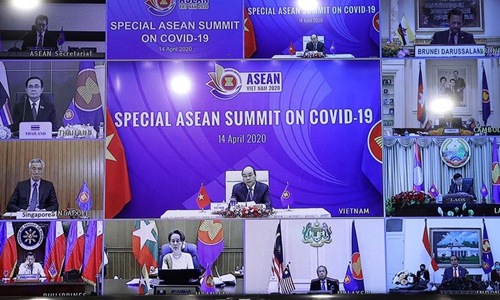ASEAN Plus Three strive to triumph over COVID-19: expert
Source:Global Times Published: 2020/4/18 18:03:40

Photo taken in the Vietnamese capital city of Hanoi on April 14, 2020 shows ASEAN leaders attending the Special ASEAN Summit on COVID-19.Photo:Xinhua
Editor's Note:
The member states of the Association of Southeast Asian Nations (ASEAN), China, Japan, and South Korea, held the Special ASEAN Plus Three (APT) Summit on Coronavirus Disease 2019 (COVID-19) via video conference on Tuesday. What message did the summit convey? How will the APT countries respond to this pandemic together? Two experts shared their insights with the Global Times.
Xu Liping, director of Center for South East Asian Studies, National Institute of International Strategy, Chinese Academy of Social Sciences
This special summit embodied the firm determination of the governments and people of APT countries to work together to fight the pandemic. It has also sent a clear message to the world: Only solidarity and cooperation can defeat the virus.
At the summit, Chinese Premier Li Keqiang proposed to "enhance all-round epidemic cooperation and build up public health capacity." This demonstrates that China has always been contributing to the regional anti-epidemic battle, shouldering the responsibility of regional power, and trying to inject new impetus into regional cooperation.
For example, China is providing the much-needed medical supplies and is willing to share experience and work together with regional countries in vaccine and drug development.
The APT countries are likely to be the first to triumph over the virulent disease. The region has once successfully defeated SARS and will overcome the COVID-19 crisis again. Besides, the APT regional cooperation mechanism has been working smoothly to achieve fruitful outcomes. Moreover, APT countries share similarities in traditional culture and governance models, which earn them some advantages. For example, people in APT countries generally have high hopes from their governments, which is conducive to the implementation of anti-epidemic measures.
The cooperation between APT countries is characterized by "emergency-driven" - the tougher the situation they face, the closer and more effective the cooperation between each other. The regional efforts at handling the 1997-98 Asian financial crisis, the SARS outbreak, and the 2004 Indian Ocean earthquake and tsunami, go on to reiterate the same. In the face of the coronavirus pandemic, APT countries have shelved historical rifts and disputes and pledged to focus on anti-epidemic cooperation.
The APT countries formulated the Chiang Mai Initiative in 2000, a mechanism for foreign currency exchange for weathering emergencies. I believe that this initiative can also be used as a valuable resource during this pandemic. This is another example of institutional and material wealth accumulated by the APT mechanism over the years.
Overall, cooperation is and will continue to be the focus and the central theme of this region.
Chen Yang, a media professional and an observer of Japanese issues
APT countries have always been helping each other during the coronavirus outbreak, which exemplifies their solid friendship and interdependence. The special summit is the latest example.
However, APT countries should also be aware of loopholes in regional cooperation.
In the era of globalization, non-traditional security threats such as infectious diseases and terrorism have crossed national boundaries. The global pandemic has further highlighted the urgency of cooperation between APT countries to cope with non-traditional security threats. To better respond to the pandemic and other crises, APT countries must bolster its preparedness.
First, as Premier Li proposed at the summit, APT countries should "intensify policy coordination to weather all kinds of risks and challenges." For example, some countries suspended travel visas of the nationals of regional members to curb the coronavirus spread, but such a measure has resulted in friction between countries due to the lack of sufficient communication. Such scenarios must be avoided through policy coordination.
Second, APT countries should establish a more effectual mechanism to maintain the supply of materials and human resources. APT countries vary in terms of developments, and some regional members have encountered serious shortages of medical supplies during the outbreak. In this regard, cooperation mechanisms need to be improved, including the establishment of emergency supply reserve centers and financial support funds.
Third, APT countries should enhance both bilateral and multilateral cooperation mechanisms. No country can win the anti-pandemic battle alone. Several bilateral and multilateral cooperation mechanisms have already been established under the APT framework. For example, Director-General Tedros Adhanom Ghebreyesus of the World Health Organization also joined the summit. Countries should strengthen and well apply these mechanisms in the future to tackle unconventional security threats.
Posted in: VIEWPOINT,ASIAN REVIEW